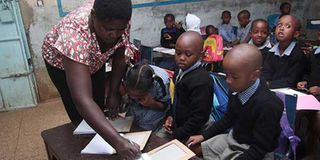CBC will give Kenya its next cheating scam

A teacher instructing Grade One pupils. PHOTO | FILE | NATION MEDIA GROUP
What you need to know:
Assessment cartels, including clever teachers, will sense the opportunity to make quick-riches by putting respective price tags on STEM and Arts and charging parents a fortune.
Even the famous “Mganga Kutoka Pemba” (witchdoctor from Pemba island) might want to cash-in, with offers to guarantee your child’s STEM fortunes.
Kenya has in the past three years stepped up efforts to eradicate cheating in its primary and secondary school certificate examinations.
Drastic measures introduced to deal with the problem include deployment of a large number of security officers in schools, arrest and prosecution of persons found with leaked exam papers, a ban on school visits by parents during the third school term and a massive cancellation of suspicious results.
The first year of enforcement of the so-called Matiang’i Rules (after then Education minister Fred Matiang’i) in 2016 produced shocking results, with only 141 candidates scoring A plain grade in the Kenya Certificate of Secondary Education (KCSE) examination nationally, down from 2,636 the previous year.
That number of A plain, which guarantee candidates admission to elite university degree courses such as medicine and law, was much lower than the 202 registered by Kabarak High School alone in the examination the previous year.
There were no results cancelled from cheating, compared with more than 5,000 in the 2015 examination, prompting the education authorities to declare it a veritable success story.
They would be less upbeat after watching a resurgence of cheating in last year’s KCSE examination, for which more than 3,000 candidates in 44 schools had their results cancelled.
But perhaps the worst is yet to come — starting in 2025! This is when the pioneer class under the new competence-based curriculum (CBC) will have their final assessment in Grade Nine at junior secondary before they can proceed to senior secondary school.
While the CBC system has replaced final exams with continuous assessments, it has effectively shifted the battleground for future courses and careers from the current Form Four to Grade Nine.
Depending on their talents, learners in senior secondary school will take career pathways through either STEM (science, technology, engineering and mathematics) or arts and sport science.
At face value, it looks pretty cool that parents will have worked with teachers in identifying and developing those talents from pre-school.
But we all know things will play out very differently, just like it happens elsewhere when talent has been made key to career opportunities and personal achievements in life.
In March this year, about 50 people, including Hollywood celebrities and company CEOs, were charged in American courts for bribing college entrance examination officials and athletic coaches to gain admission for their children.
Many Kenyans parents, not quite convinced that their 14-year-old children can make career choices so early in life, will seek to beat the system and push their personal preferences, too — including paying bribes to teachers and education officials.
Assessment cartels, including clever teachers, will sense the opportunity to make quick-riches by putting respective price tags on STEM and Arts and charging parents a fortune. Even the famous “Mganga Kutoka Pemba” (witchdoctor from Pemba island) might want to cash-in, with offers to guarantee your child’s STEM fortunes.
[email protected]; @otienootieno





